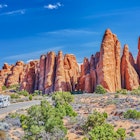
Yosemite suspends its reservation system - but will overcrowding return?

Nov 22, 2022 • 4 min read

Yosemite National Park suspends its online reservation system © Getty Images
Many national parks across the US introduced reservation policies to address increasing visitor numbers during the pandemic. But now, one park has decided to buck the trend... at least temporarily.
Three years after launching it, Yosemite National Park announced on Thursday that the reservation policy for summer day use will be suspended in 2023.
"This decision will help our visitors, especially those from other states and countries who tend to plan their once-in-a-lifetime vacations to Yosemite about a year in advance," said Jonathan Farrington, CEO and Executive Director of the Yosemite Mariposa County Tourism Bureau (YMTCB).
Farrington, who represents the interests of local tourism business owners, added, "for our friends who live closer to the region, this allows them to be more spontaneous with their plans to visit."
How to spend your first visit to Yosemite National Park

Why was the reservation system introduced?
In 2022, anyone planning to visit the park between late May through September and enter between 6am and 4pm needed a reservation to enter Yosemite in addition to paying the park entrance fee or showing an America the Beautiful parks pass.
In 2021, a pre-booked day pass was required for entry.
When is the best time to visit US and Canada's national parks?
The lottery system for reservations was part of a series of 'pilots' initially put in place to manage the influx of visitors wanting to get outdoors during the pandemic. Later it allowed officials to manage multiple construction projects, like repairing roads, trails, campgrounds, and visitor facilities, through funding recently received from the recent Great American Outdoors Act.
But it wasn't a perfect solution. The online lottery required people to secure their spots at least six months in advance and to compete with thousands of other campers and hikers to secure their preferred day. If people missed out on tickets or didn't get the times they wanted, they gave up on visiting parks because they obviously couldn't show up otherwise without one.

Without the reservation system in place, will overcrowding return?
Now that most construction projects are finished or close to completion, and social distancing is no longer mandated in parks, officials feel the timing is right to suspend the pass.
The YMTCB is hopeful that in Mariposa County, where 50% of all employment is dependent on tourism, visitor numbers could bounce back to pre-pandemic levels in 2023 without the deterrent of the pass. They say businesses in the wider community, particularly in the accommodation sector, have struggled with occupancy over the past three years and many blame the reservation system for curtailing visitation during peak season.
But if the reservation system — intended to promote visitor safety and enjoyment while protecting Yosemite's wildlife and natural resources — is suspended, will the problems associated with overcrowding return?
10 least-visited US national parks
Overcrowding existed long before the pandemic began and while Yosemite suggests that a similar and more long-term solution could be in place by 2024, the National Parks Conservation Association (NPCA), a nonprofit working to advocate on behalf of the National Parks System, is worried that suspending the pass could send mixed messages to visitors. Some national parks, like Glacier and Zion, have suspended their reservation passes for off-season. Yosemite is doing so for an entire year.
"We're glad the park has committed to finding a long-term solution to the overcrowding problems that have long been endemic at Yosemite," Mark Rose, Sierra Nevada program manager at the NPCA, tells Lonely Planet. "However, it's disappointing that park managers have chosen to hit pause on a highly successful reservation system in the meantime.
"We don't want to see a return to the days of visitors being stuck in hours-long traffic lines before hiking overcrowded trails. This sudden change to pause the reservation system for a summer sends mixed messages and creates more uncertainty and confusion for visitors and nearby communities."
Looking ahead to a permanent solution
While the reservation system is suspended in 2023, park officials in Yosemite will look at more permanent ways to reduce overcrowding. According to the NPCA, a long-term solution would need a more thorough legal process, which is what the park intends to start with.
In the meantime, visitors can do their part to reduce overcrowding by arriving early to avoid queues at Yosemite's gates; visiting outside of peak hours (10am to 2pm); using public transport or commercial tours such as the Yosemite Valley Shuttle system instead of taking cars; visiting off-season and spending full days in the park rather than trying to squeeze as much as possible in during short burst visits.
"Yosemite Mariposa County is a four-season destination, and each season is spectacular and worth experiencing," Farrington said. "If you've visited in summer, you'll love the beauty and cooler temperatures of fall, tranquility of winter and the waterfalls and wildflowers of spring."
Explore related stories








 National ParksThese 12 unique lodges let you stay within US national parks
National ParksThese 12 unique lodges let you stay within US national parksApr 22, 2024 • 13 min read

